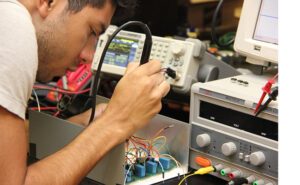 This area of emphasis involves the study of electrical and electronic circuits and control systems. Electrical and electronic systems range from high voltage applications in power distribution and machinery to applications of microelectronics. Devices in the form of electrical systems appear in everything from high-end computer systems to the watch on your wrist. Household appliances such as the washer and dryer have electronic systems to improve user control.
This area of emphasis involves the study of electrical and electronic circuits and control systems. Electrical and electronic systems range from high voltage applications in power distribution and machinery to applications of microelectronics. Devices in the form of electrical systems appear in everything from high-end computer systems to the watch on your wrist. Household appliances such as the washer and dryer have electronic systems to improve user control.
The educational goal of this area of emphasis is to prepare graduates to design and develop electrical, electronic and control systems for industrial applications.
This research program allows the student to participate in a dual degree program with Environmental Health Science. This program fully integrates the two accredited degree programs, Environmental Health Science and Biological Engineering, into a 5-year course of study which culminates in the awarding of both degrees.
Faculty and Student Activities
Applied Electrostatics
Electrostatic phenomena and technology are studied here and developed for direct solution of practical problems in agricultural, biological, and industrial systems. Electrostatic forces and processes are being beneficially applied to a number of significant operations to enhance energy efficiency, reduce resource input and environmental-pollutant output, and improve overall product quality and economic competitiveness.
Non-destructive Sensing
The non-destructive sensing laboratory specializes in measuring internal defects opposed to surface defects. The program’s objective is to relate internal defects to surface features using sensofusion approaches, and is available for cooperative studies.
Machine Vision
This program is focused on the development of optical sensing systems based on visible/near-infrared spectroscopy and spectral imaging for stress and disease detection in peanut and cotton, and for evaluation of quality and composition of foods and composting agricultural products.
Career Opportunities
As engineers, graduates with this specialization are qualified to:
- Design circuits for computers and control systems,
- Quality Control of electronic and electrical equipment,
- Develop specifications for semiconductor components used in manufactured products,
- Design digital signal processing systems,
- Automated systems for materials processing,
- Design electrical, power supply, and monitoring systems,
- Investigate, develop and evaluate new motor and control technologies.


